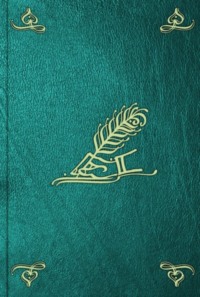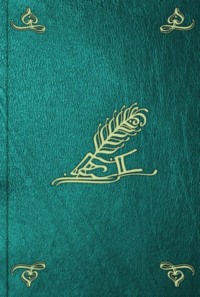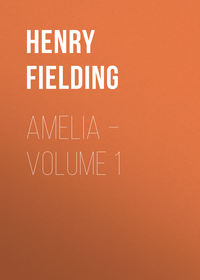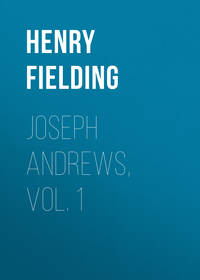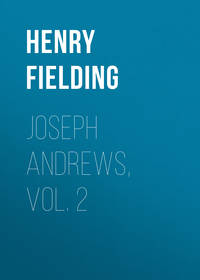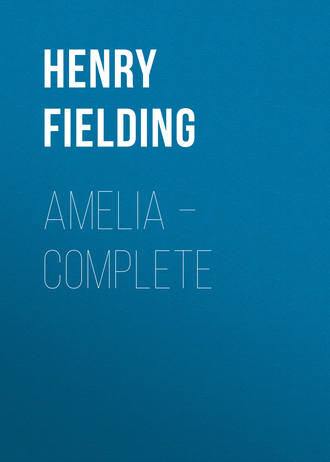 полная версия
полная версияAmelia – Complete
Trent’s pockets became at last dry by means of these loans. His own loss, indeed, was trifling; for the stakes of the games were no higher than crowns, and betting (as it is called) was that to which Booth owed his ruin. The gentlemen, therefore, pretty well knowing Booth’s circumstances, and being kindly unwilling to win more of a man than he was worth, declined playing any longer, nor did Booth once ask them to persist, for he was ashamed of the debt which he had already contracted to Trent, and very far from desiring to encrease it.
The company then separated. The two victors and Trent went off in their chairs to their several houses near Grosvenor-square, and poor Booth, in a melancholy mood, walked home to his lodgings. He was, indeed, in such a fit of despair, that it more than once came into his head to put an end to his miserable being.
But before we introduce him to Amelia we must do her the justice to relate the manner in which she spent this unhappy evening. It was about seven when Booth left her to walk in the park; from this time till past eight she was employed with her children, in playing with them, in giving them their supper, and in putting them to bed.
When these offices were performed she employed herself another hour in cooking up a little supper for her husband, this being, as we have already observed, his favourite meal, as indeed it was her’s; and, in a most pleasant and delightful manner, they generally passed their time at this season, though their fare was very seldom of the sumptuous kind.
It now grew dark, and her hashed mutton was ready for the table, but no Booth appeared. Having waited therefore for him a full hour, she gave him over for that evening; nor was she much alarmed at his absence, as she knew he was in a night or two to be at the tavern with some brother-officers; she concluded therefore that they had met in the park, and had agreed to spend this evening together.
At ten then she sat down to supper by herself, for Mrs. Atkinson was then abroad. And here we cannot help relating a little incident, however trivial it may appear to some. Having sat some time alone, reflecting on their distressed situation, her spirits grew very low; and she was once or twice going to ring the bell to send her maid for half-a-pint of white wine, but checked her inclination in order to save the little sum of sixpence, which she did the more resolutely as she had before refused to gratify her children with tarts for their supper from the same motive. And this self-denial she was very probably practising to save sixpence, while her husband was paying a debt of several guineas incurred by the ace of trumps being in the hands of his adversary.
Instead therefore of this cordial she took up one of the excellent Farquhar’s comedies, and read it half through; when, the clock striking twelve, she retired to bed, leaving the maid to sit up for her master. She would, indeed, have much more willingly sat up herself, but the delicacy of her own mind assured her that Booth would not thank her for the compliment. This is, indeed, a method which some wives take of upbraiding their husbands for staying abroad till too late an hour, and of engaging them, through tenderness and good nature, never to enjoy the company of their friends too long when they must do this at the expence of their wives’ rest.
To bed then she went, but not to sleep. Thrice indeed she told the dismal clock, and as often heard the more dismal watchman, till her miserable husband found his way home, and stole silently like a thief to bed to her; at which time, pretending then first to awake, she threw her snowy arms around him; though, perhaps, the more witty property of snow, according to Addison, that is to say its coldness, rather belonged to the poor captain.
Chapter vi. – Read, gamester, and observe
Booth could not so well disguise the agitations of his mind from Amelia, but that she perceived sufficient symptoms to assure her that some misfortune had befallen him. This made her in her turn so uneasy that Booth took notice of it, and after breakfast said, “Sure, my dear Emily, something hath fallen out to vex you.”
Amelia, looking tenderly at him, answered, “Indeed, my dear, you are in the right; I am indeed extremely vexed.” “For Heaven’s sake,” said he, “what is it?” “Nay, my love,” cried she, “that you must answer yourself. Whatever it is which hath given you all that disturbance that you in vain endeavour to conceal from me, this it is which causes all my affliction.”
“You guess truly, my sweet,” replied Booth; “I am indeed afflicted, and I will not, nay I cannot, conceal the truth from you. I have undone myself, Amelia.”
“What have you done, child?” said she, in some consternation; “pray, tell me.”
“I have lost my money at play,” answered he.
“Pugh!” said she, recovering herself – “what signifies the trifle you had in your pocket? Resolve never to play again, and let it give you no further vexation; I warrant you, we will contrive some method to repair such a loss.”
“Thou heavenly angel! thou comfort of my soul!” cried Booth, tenderly embracing her; then starting a little from her arms, and looking with eager fondness in her eyes, he said, “Let me survey thee; art thou really human, or art thou not rather an angel in a human form? O, no,” cried he, flying again into her arms, “thou art my dearest woman, my best, my beloved wife!”
Amelia, having returned all his caresses with equal kindness, told him she had near eleven guineas in her purse, and asked how much she should fetch him. “I would not advise you, Billy, to carry too much in your pocket, for fear it should be a temptation to you to return to gaming, in order to retrieve your past losses. Let me beg you, on all accounts, never to think more, if possible, on the trifle you have lost, anymore than if you had never possessed it.”
Booth promised her faithfully he never would, and refused to take any of the money. He then hesitated a moment, and cried – “You say, my dear, you have eleven guineas; you have a diamond ring, likewise, which was your grandmother’s – I believe that is worth twenty pounds; and your own and the child’s watch are worth as much more.”
“I believe they would sell for as much,” cried Amelia; “for a pawnbroker of Mrs. Atkinson’s acquaintance offered to lend me thirty-five pounds upon them when you was in your last distress. But why are you computing their value now?”
“I was only considering,” answered he, “how much we could raise in any case of exigency.”
“I have computed it myself,” said she; “and I believe all we have in the world, besides our bare necessary apparel, would produce about sixty pounds: and suppose, my dear,” said she, “while we have that little sum, we should think of employing it some way or other, to procure some small subsistence for ourselves and our family. As for your dependence on the colonel’s friendship, it is all vain, I am afraid, and fallacious. Nor do I see any hopes you have from any other quarter, of providing for yourself again in the army. And though the sum which is now in our power is very small, yet we may possibly contrive with it to put ourselves into some mean way of livelihood. I have a heart, my Billy, which is capable of undergoing anything for your sake; and I hope my hands are as able to work as those which have been more inured to it. But think, my dear, think what must be our wretched condition, when the very little we now have is all mouldered away, as it will soon be in this town.”
When poor Booth heard this, and reflected that the time which Amelia foresaw was already arrived (for that he had already lost every farthing they were worth), it touched him to the quick; he turned pale, gnashed his teeth, and cried out, “Damnation! this is too much to bear.”
Amelia was thrown into the utmost consternation by this behaviour; and, with great terror in her countenance, cried out, “Good Heavens! my dear love, what is the reason of this agony?”
“Ask me no questions,” cried he, “unless you would drive me to madness.”
“My Billy! my love!” said she, “what can be the meaning of this? – I beg you will deal openly with me, and tell me all your griefs.”
“Have you dealt fairly with me, Amelia?” said he.
“Yes, surely,” said she; “Heaven is my witness how fairly.”
“Nay, do not call Heaven,” cried he, “to witness a falsehood. You have not dealt openly with me, Amelia. You have concealed secrets from me; secrets which I ought to have known, and which, if I had known, it had been better for us both.”
“You astonish me as much as you shock me,” cried she. “What falsehood, what treachery have I been guilty of?”
“You tell me,” said he, “that I can have no reliance on James; why did not you tell me so before?”
“I call Heaven again,” said she, “to witness; nay, I appeal to yourself for the truth of it; I have often told you so. I have told you I disliked the man, notwithstanding the many favours he had done you. I desired you not to have too absolute a reliance upon him. I own I had once an extreme good opinion of him, but I changed it, and I acquainted you that I had so – ”
“But not,” cries he, “with the reasons why you had changed it.”
“I was really afraid, my dear,” said she, “of going too far. I knew the obligations you had to him; and if I suspected that he acted rather from vanity than true friendship – ”
“Vanity!” cries he; “take care, Amelia: you know his motive to be much worse than vanity – a motive which, if he had piled obligations on me till they had reached the skies, would tumble all down to hell. It is vain to conceal it longer – I know all – your confidant hath told me all.”
“Nay, then,” cries she, “on my knees I entreat you to be pacified, and hear me out. It was, my dear, for you, my dread of your jealous honour, and the fatal consequences.”
“Is not Amelia, then,” cried he, “equally jealous of my honour? Would she, from a weak tenderness for my person, go privately about to betray, to undermine the most invaluable treasure of my soul? Would she have me pointed at as the credulous dupe, the easy fool, the tame, the kind cuckold, of a rascal with whom I conversed as a friend?”
“Indeed you injure me,” said Amelia. “Heaven forbid I should have the trial! but I think I could sacrifice all I hold most dear to preserve your honour. I think I have shewn I can. But I will – when you are cool, I will – satisfy you I have done nothing you ought to blame.”
“I am cool then,” cries he; “I will with the greatest coolness hear you. – But do not think, Amelia, I have the least jealousy, the least suspicion, the least doubt of your honour. It is your want of confidence in me alone which I blame.”
“When you are calm,” cried she, “I will speak, and not before.”
He assured her he was calm; and then she said, “You have justified my conduct by your present passion, in concealing from you my suspicions; for they were no more, nay, it is possible they were unjust; for since the doctor, in betraying the secret to you, hath so far falsified my opinion of him, why may I not be as well deceived in my opinion of the colonel, since it was only formed on some particulars in his behaviour which I disliked? for, upon my honour, he never spoke a word to me, nor hath been ever guilty of any direct action, which I could blame.” She then went on, and related most of the circumstances which she had mentioned to the doctor, omitting one or two of the strongest, and giving such a turn to the rest, that, if Booth had not had some of Othello’s blood in him, his wife would have almost appeared a prude in his eyes. Even he, however, was pretty well pacified by this narrative, and said he was glad to find a possibility of the colonel’s innocence; but that he greatly commended the prudence of his wife, and only wished she would for the future make him her only confidant.
Amelia, upon that, expressed some bitterness against the doctor for breaking his trust; when Booth, in his excuse, related all the circumstances of the letter, and plainly convinced her that the secret had dropt by mere accident from the mouth of the doctor.
Thus the husband and wife became again reconciled, and poor Amelia generously forgave a passion of which the sagacious reader is better acquainted with the real cause than was that unhappy lady.
Chapter vii. – In which Booth receives a visit from Captain Trent
When Booth grew perfectly cool, and began to reflect that he had broken his word to the doctor, in having made the discovery to his wife which we have seen in the last chapter, that thought gave him great uneasiness; and now, to comfort him, Captain Trent came to make him a visit.
This was, indeed, almost the last man in the world whose company he wished for; for he was the only man he was ashamed to see, for a reason well known to gamesters; among whom, the most dishonourable of all things is not to pay a debt, contracted at the gaming-table, the next day, or the next time at least that you see the party.
Booth made no doubt but that Trent was come on purpose to receive this debt; the latter had been therefore scarce a minute in the room before Booth began, in an aukward manner, to apologise; but Trent immediately stopt his mouth, and said, “I do not want the money, Mr. Booth, and you may pay it me whenever you are able; and, if you are never able, I assure you I will never ask you for it.”
This generosity raised such a tempest of gratitude in Booth (if I may be allowed the expression), that the tears burst from his eyes, and it was some time before he could find any utterance for those sentiments with which his mind overflowed; but, when he began to express his thankfulness, Trent immediately stopt him, and gave a sudden turn to their discourse.
Mrs. Trent had been to visit Mrs. Booth on the masquerade evening, which visit Mrs. Booth had not yet returned. Indeed, this was only the second day since she had received it. Trent therefore now told his friend that he should take it extremely kind if he and his lady would waive all ceremony, and sup at their house the next evening. Booth hesitated a moment, but presently said, “I am pretty certain my wife is not engaged, and I will undertake for her. I am sure she will not refuse anything Mr. Trent can ask.” And soon after Trent took Booth with him to walk in the Park.
There were few greater lovers of a bottle than Trent; he soon proposed therefore to adjourn to the King’s Arms tavern, where Booth, though much against his inclination, accompanied him. But Trent was very importunate, and Booth did not think himself at liberty to refuse such a request to a man from whom he had so lately received such obligations.
When they came to the tavern, however, Booth recollected the omission he had been guilty of the night before. He wrote a short note therefore to his wife, acquainting her that he should not come home to supper; but comforted her with a faithful promise that he would on no account engage himself in gaming.
The first bottle passed in ordinary conversation; but, when they had tapped the second, Booth, on some hints which Trent gave him, very fairly laid open to him his whole circumstances, and declared he almost despaired of mending them. “My chief relief,” said he, “was in the interest of Colonel James; but I have given up those hopes.”
“And very wisely too,” said Trent “I say nothing of the colonel’s good will. Very likely he may be your sincere friend; but I do not believe he hath the interest he pretends to. He hath had too many favours in his own family to ask any more yet a while. But I am mistaken if you have not a much more powerful friend than the colonel; one who is both able and willing to serve you. I dined at his table within these two days, and I never heard kinder nor warmer expressions from the mouth of man than he made use of towards you. I make no doubt you know whom I mean.”
“Upon my honour I do not,” answered Booth; “nor did I guess that I had such a friend in the world as you mention.”
“I am glad then,” cries Trent, “that I have the pleasure of informing you of it.” He then named the noble peer who hath been already so often mentioned in this history.
Booth turned pale and started at his name. “I forgive you, my dear Trent,” cries Booth, “for mentioning his name to me, as you are a stranger to what hath passed between us.”
“Nay, I know nothing that hath passed between you,” answered Trent. “I am sure, if there is any quarrel between you of two days’ standing, all is forgiven on his part.”
“D – n his forgiveness!” said Booth. “Perhaps I ought to blush at what I have forgiven.”
“You surprize me!” cries Trent. “Pray what can be the matter?”
“Indeed, my dear Trent,” cries Booth, very gravely, “he would have injured me in the tenderest part. I know not how to tell it you; but he would have dishonoured me with my wife.”
“Sure, you are not in earnest!” answered Trent; “but, if you are, you will pardon me for thinking that impossible.”
“Indeed,” cries Booth, “I have so good an opinion of my wife as to believe it impossible for him to succeed; but that he should intend me the favour you will not, I believe, think an impossibility.”
“Faith! not in the least,” said Trent. “Mrs. Booth is a very fine woman; and, if I had the honour to be her husband, I should not be angry with any man for liking her.”
“But you would be angry,” said Booth, “with a man, who should make use of stratagems and contrivances to seduce her virtue; especially if he did this under the colour of entertaining the highest friendship for yourself.”
“Not at all,” cries Trent. “It is human nature.”
“Perhaps it is,” cries Booth; “but it is human nature depraved, stript of all its worth, and loveliness, and dignity, and degraded down to a level with the vilest brutes.”
“Look ye, Booth,” cries Trent, “I would not be misunderstood. I think, when I am talking to you, I talk to a man of sense and to an inhabitant of this country, not to one who dwells in a land of saints. If you have really such an opinion as you express of this noble lord, you have the finest opportunity of making a complete fool and bubble of him that any man can desire, and of making your own fortune at the same time. I do not say that your suspicions are groundless; for, of all men upon earth I know, my lord is the greatest bubble to women, though I believe he hath had very few. And this I am confident of, that he hath not the least jealousy of these suspicions. Now, therefore, if you will act the part of a wise man, I will undertake that you shall make your fortune without the least injury to the chastity of Mrs. Booth.”
“I do not understand you, sir,” said Booth.
“Nay,” cries Trent, “if you will not understand me, I have done. I meant only your service; and I thought I had known you better.”
Booth begged him to explain himself. “If you can,” said he, “shew me any way to improve such circumstances as I have opened to you, you may depend on it I shall readily embrace it, and own my obligations to you.”
“That is spoken like a man,” cries Trent. “Why, what is it more than this? Carry your suspicions in your own bosom. Let Mrs. Booth, in whose virtue I am sure you may be justly confident, go to the public places; there let her treat my lord with common civility only; I am sure he will bite. And thus, without suffering him to gain his purpose, you will gain yours. I know several who have succeeded with him in this manner.”
“I am very sorry, sir,” cries Booth, “that you are acquainted with any such rascals. I do assure you, rather than I would act such a part, I would submit to the hardest sentence that fortune could pronounce against me.”
“Do as you please, sir,” said Trent; “I have only ventured to advise you as a friend. But do you not think your nicety is a little over-scrupulous?”
“You will excuse me, sir,” said Booth; “but I think no man can be too scrupulous in points which concern his honour.”
“I know many men of very nice honour,” answered Trent, “who have gone much farther; and no man, I am sure, had ever a better excuse for it than yourself. You will forgive me, Booth, since what I speak proceeds from my love to you; nay, indeed, by mentioning your affairs to me, which I am heartily sorry for, you have given me a right to speak. You know best what friends you have to depend upon; but, if you have no other pretensions than your merit, I can assure you you would fail, if it was possible you could have ten times more merit than you have. And, if you love your wife, as I am convinced you do, what must be your condition in seeing her want the necessaries of life?”
“I know my condition is very hard,” cries Booth; “but I have one comfort in it, which I will never part with, and that is innocence. As to the mere necessaries of life, however, it is pretty difficult to deprive us of them; this I am sure of, no one can want them long.”
“Upon my word, sir,” cries Trent, “I did not know you had been so great a philosopher. But, believe me, these matters look much less terrible at a distance than when they are actually present. You will then find, I am afraid, that honour hath no more skill in cookery than Shakspear tells us it hath in surgery. D – n me if I don’t wish his lordship loved my wife as well as he doth yours, I promise you I would trust her virtue; and, if he should get the better of it, I should have people of fashion enough to keep me in countenance.”
Their second bottle being now almost out, Booth, without making any answer, called for a bill. Trent pressed very much the drinking another bottle, but Booth absolutely refused, and presently afterwards they parted, not extremely well satisfied with each other. They appeared, indeed, one to the other, in disadvantageous lights of a very different kind. Trent concluded Booth to be a very silly fellow, and Booth began to suspect that Trent was very little better than a scoundrel.
Chapter viii. – Contains a letter and other matters
We will now return to Amelia; to whom, immediately upon her husband’s departure to walk with Mr. Trent, a porter brought the following letter, which she immediately opened and read:
“MADAM, – The quick despatch which I have given to your first commands will I hope assure you of the diligence with which I shall always obey every command that you are pleased to honour me with. I have, indeed, in this trifling affair, acted as if my life itself had been at stake; nay, I know not but it may be so; for this insignificant matter, you was pleased to tell me, would oblige the charming person in whose power is not only my happiness, but, as I am well persuaded, my life too. Let me reap therefore some little advantage in your eyes, as you have in mine, from this trifling occasion; for, if anything could add to the charms of which you are mistress, it would be perhaps that amiable zeal with which you maintain the cause of your friend. I hope, indeed, she will be my friend and advocate with the most lovely of her sex, as I think she hath reason, and as you was pleased to insinuate she had been. Let me beseech you, madam, let not that dear heart, whose tenderness is so inclined to compassionate the miseries of others, be hardened only against the sufferings which itself occasions. Let not that man alone have reason to think you cruel, who, of all others, would do the most to procure your kindness. How often have I lived over in my reflections, in my dreams, those two short minutes we were together! But, alas! how faint are these mimicries of the imagination! What would I not give to purchase the reality of such another blessing! This, madam, is in your power to bestow on the man who hath no wish, no will, no fortune, no heart, no life, but what are at your disposal. Grant me only the favour to be at Lady – ‘s assembly. You can have nothing to fear from indulging me with a moment’s sight, a moment’s conversation; I will ask no more. I know your delicacy, and had rather die than offend it. Could I have seen you sometimes, I believe the fear of offending you would have kept my love for ever buried in my own bosom; but, to be totally excluded even from the sight of what my soul doats on is what I cannot bear. It is that alone which hath extorted the fatal secret from me. Let that obtain your forgiveness for me. I need not sign this letter otherwise than with that impression of my heart which I hope it bears; and, to conclude it in any form, no language hath words of devotion strong enough to tell you with what truth, what anguish, what zeal, what adoration I love you.”


